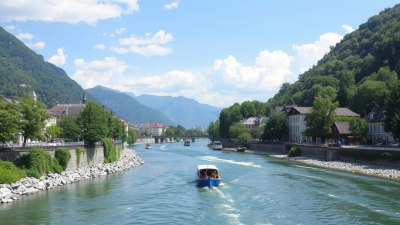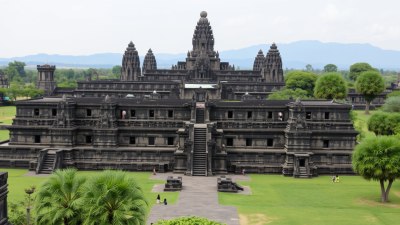Travel Plans and Other Works of Fiction
Explore the depths of creativity in travel-themed fiction and its impact on readers.

Travel plans and their reflections in various works of fiction have long captivated readers and inspired authors. Narratives about journeys often serve a dual purpose: they not only transport readers to distant lands but also delve deep into the human experience juxtaposed against the backdrop of exploration. This article examines several notable works of fiction that revolve around travel plans, shedding light on how these stories resonate with audiences while inspiring their own adventures and dreams.
One of the primary reasons travel-themed fiction appeals to readers is its ability to evoke a sense of adventure and discovery. The anticipation of visiting new places, meeting new people, and experiencing different cultures excites both the characters within the stories and the readers themselves. For instance, consider the classic adventure novel 'Around the World in Eighty Days' by Jules Verne. Phileas Fogg's meticulously planned journey reflects not only the excitement of travel but also the unpredictability that often accompanies it. Readers are drawn into Fogg's world, rooting for his success and experiencing the thrill of the adventure vicariously.
Literary Representations of Travel
Fictional works that center around travel plans often employ various literary techniques to transport the reader. Descriptive language immerses the reader in the sights and sounds of the journey, while character development reveals motivations, fears, and personal growth that often accompany travel. For instance, in 'The Beach' by Alex Garland, the protagonist's journey to a secluded island in Thailand embodies not only the allure of paradise but also a quest for self-discovery. Through the lens of travel, these narratives explore deeper themes of longing, identity, and belonging.
Travel as a Metaphor
In many literary works, travel transcends geographic boundaries and becomes a metaphor for personal transformation. Characters embark on physical journeys that often parallel their emotional or psychological journeys. In works like 'Eat, Pray, Love' by Elizabeth Gilbert, travel serves as a catalyst for healing and introspection. Gilbert’s quest across Italy, India, and Indonesia speaks not only to the joy of exploring new cuisines and cultures but also to the universal search for meaning and fulfillment.
The Influence of Setting
The setting plays a crucial role in shaping travel plans and experiences in fiction. From bustling cities to serene countrysides, each location provides a unique backdrop that influences the narrative and character interactions. In 'The Alchemist' by Paulo Coelho, the setting of the Andalusian landscape and the deserts of Egypt frames Santiago’s journey of self-discovery. The vibrant imagery and cultural details enhance the mystical elements of the story, making the travel experience integral to the plot's theme of following one’s dreams.
The Role of Cultural Discovery
Throughout fiction, travel narratives often delve into cultural comparisons and the experiences of globalization. In 'The Namesake' by Jhumpa Lahiri, the protagonist's journey between India and America underscores the struggle between cultural identity and personal belonging. Through Gogol’s travels, readers gain insights into the complexities of immigration, family expectations, and the ways in which travel fosters understanding—or sometimes, conflict—between cultures.
Travel and Human Connection
Travel-themed fiction also explores the interpersonal connections that can form through shared experiences. Characters often develop friendships, romances, or rivalries during their journeys, highlighting the idea that travel brings people together in significant ways. In 'A Year in Provence' by Peter Mayle, the author’s witty recounting of his experiences in the French countryside illustrates not only the beauty of the landscape but also the connections forged with local inhabitants. These bonds enrich the narrative, emphasizing the importance of human connections in the context of travel.
Modern Travel Narratives
In the modern literary landscape, travel-themed works continue to evolve alongside technological advancements. The rise of digital nomadism and the quest for experiential travel have influenced contemporary narratives. Authors like Pico Iyer, in his essays and travelogues, explore themes of mindfulness and the idea of traveling for self-improvement rather than just leisure. As society continues to change, so too do the stories we tell about travel, reflecting current issues such as sustainability, technology, and the quest for authenticity.
The Transformative Power of Travel
Ultimately, the transformative power of travel—an element prevalent in many works of fiction—resonates deeply with readers. The idea that a journey can lead to self-discovery and a better understanding of oneself and the world is a compelling narrative thread. As readers engage with these stories, they are reminded of their own aspirations to travel, explore, and expand their horizons.
Influence of Travel Literature
Travel literature has also inspired various other art forms, from films to visual art. Cinematic adaptations of travel novels, such as 'Into the Wild' or 'Wild,' bring the themes of self-discovery and adventure to life in a different medium, further popularizing the notion of travel as a life-changing experience. Additionally, photography and blogging have transformed the way stories about travel are shared, allowing individuals to reflect on their journeys in real-time.
The realm of travel plans and fiction intertwines in unique and compelling ways, inviting readers to embark on their own journeys of discovery. Whether it’s through the lens of adventure, cultural exploration, or human connection, these narratives capture the essence of travel as a means of transformation, making them timeless and relevant across generations. As readers dive into these fictional worlds, they are often prompted to reflect on their own travel aspirations and the integral role travel plays in our lives.











